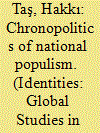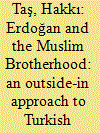| Srl | Item |
| 1 |
ID:
184072


|
|
|
|
|
| Summary/Abstract |
Inspired by the populists’ salient urge to recalibrate and locate contingent developments within a larger temporal order and establish historical continuity, this paper dwells on the chronopolitics of national populism and calls for a systematic treatment of time in these movements. Focusing on the neglected narrative dimension, such an inquiry will afford an alternative reading from which to engage with and critique the magnitude of populism. This study argues that despite ample variance and claims of uniqueness, national populisms employ a shared temporal template that accounts for a particular national subjectivity through a set of timing and sequencing of events complemented by affective stimuli. It focuses on the case of Turkey. More pronounced since 2013 Gezi Protests, the rising tide of national populism under President Tayyip Erdoğan’s rule encapsulates how these populisms conflate the past, present, and future into a single narrative about the people’s survival and prosperity.
|
|
|
|
|
|
|
|
|
|
|
|
|
|
|
|
| 2 |
ID:
188180


|
|
|
|
|
| Summary/Abstract |
Diasporas do not arise from fixed connections to objective circumstances such as dispersion or relation to a homeland, but instead constantly are negotiated and re-constituted. Ranging from internal gradual change to sudden exogenous change, the re-making of a diaspora can take diverse forms. Despite the prevalence of constructivist and processual approaches, however, research on diaspora identity change has been limited. This paper takes a comparative historical perspective to the post-2016 diasporization of the Gülen Movement (GM) and discusses how the GM responded differently to sudden exogenous shocks in 1997, 2007, and 2016. In both historical institutionalism and rational choice theories, the sudden exogenous shocks do the heavy lifting to explain change; however, it is rather the endogenous parameters that account for the variation in the GM’s responses to those shocks.
|
|
|
|
|
|
|
|
|
|
|
|
|
|
|
|
| 3 |
ID:
187480


|
|
|
|
|
| Summary/Abstract |
Amidst multiple foreign policy flip-flops of the Turkish government, the Middle East is where observers agree most about the explanatory priority of ideational factors over realpolitik calculations. The assertive foreign policy activism to extend the country’s role in the region has largely been linked to the Islamist leanings of the ruling Justice and Development Party (AKP). This study revisits Turkey’s Middle East policy with a particular focus on the AKP’s relations with the Muslim Brotherhood (Ikhwan al Muslimin), which marked Turkish foreign policy formulation and implementation in multiple theatres from Yemen to Egypt to Libya. Using a neoclassical realist approach, it argues that the AKP’s ideological ties to the Ikhwan are significant for the availability of new resources but Turkish foreign policy behavior in the Middle East, including relations with the Ikhwan, reflects a grand strategy to respond to systemic and sub-systemic stimuli.
|
|
|
|
|
|
|
|
|
|
|
|
|
|
|
|
| 4 |
ID:
188174


|
|
|
|
|
| Summary/Abstract |
Diasporas have become a topic of academic and political discussion and interest since 2000. Until recently, most diaspora research has focused on the ways the states in the Global North ‘receive’ outsiders but has devoted limited scrutiny to the role of sending states in shaping opportunity structures abroad.1 The recently growing literature on diaspora politics draw our attention to the rise of state-led diaspora engagement initiatives which aim at cultivating, (re)building, (re)shaping and (de/re)mobilizing diasporas. Currently, more than one hundred states have established forms of diaspora engagement policies and institutions, with a variety of motivations.2 Scholars try to understand the development of diaspora-engagement policies cultivated by political actors in the homeland from various disciplines including international relations, political science and sociology.
|
|
|
|
|
|
|
|
|
|
|
|
|
|
|
|